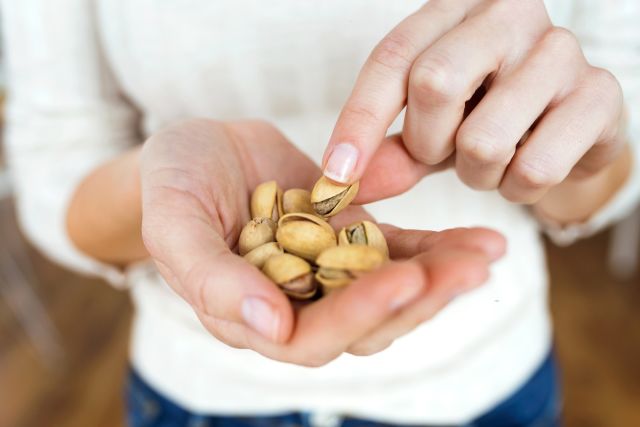Updated on November 9, 2023.
Are you hungry and looking for something to hold you over until dinner? Consider trying a handful of nuts. Not only can they help you feel fuller for longer, but recent evidence suggests they may help people with diabetes manage their blood sugar.
All about nuts
Cashews, almonds, walnuts, and most other nuts are technically fruits—single-seeded, dry fruits that are high in oil. One notable exception is the peanut, which is actually a legume, or part of the family that includes lentils, chickpeas, and soybeans. But no matter how you categorize them, nuts are rich in nutrients, unsaturated fats, proteins, fiber, and minerals.
Delicious and nutritious, nuts contribute to overall good health in many different ways. Research shows that they support better metabolic health, helping to keep blood pressure, cholesterol, and other important benchmarks within a healthy range. Consuming them regularly may also help lower the risk of developing a number of chronic conditions, including cardiovascular disease (CVD) and some cancers. Nuts may add a measure of protection against the risk of death from stroke, CVD, respiratory diseases, and infections, as well.
The nuts and type 2 diabetes connection
In addition to their general health benefits, research suggests that eating nuts may help prevent and manage type 2 diabetes. For example, in a 2023 review of studies published in the journal Nutrients, some studies found that people who ate nuts as a regular part of their diets had a lower risk of developing the condition. For those who had already been diagnosed with type 2 diabetes, eating nuts was associated with somewhat better control of blood sugar.
Researchers theorized there were several possible reasons for these effects:
- Due to their protein, fat, and fiber, nuts may slow down how fast your stomach empties, making you feel fuller. In turn, this may help prevent spikes in blood sugar.
- The unsaturated fatty acids in nuts may promote insulin sensitivity, which helps regulate blood sugar.
- Nuts contain magnesium, which has been positively tied to blood sugar control.
- Nuts may stimulate the growth of good bacteria in the gut. This may contribute to glucose tolerance and lower inflammation.
- Nuts may affect genes that control the mechanisms involved in diabetes.
Nuts may also be protective longer-term for people with type 2 diabetes because they don’t seem to be associated with weight gain, despite being rich in calories and fat. Instead, research suggests that eating a moderate amount of nuts regularly is linked to a lower likelihood of being overweight, and even with losing weight. Weight gain or elevated weight in people with type 2 diabetes raises the risk of developing diabetes complications and comorbidities (other health conditions).
Go nuts
How many nuts should someone with diabetes eat for health benefits? One 2019 study published in Circulation Research found that people with type 2 diabetes significantly lowered their risk of heart disease and overall death by eating five or more 1-ounce servings of nuts, especially tree nuts such as walnuts, almonds, Brazil nuts, hazelnuts, and pistachios, per week. Other specialists recommend four to six such servings per week. To get the most benefit, make sure they’re unsalted.
Nut butters may impart benefits, too, though the American Heart Association recommends that you take a careful look at the nutrition labels. Select products that are low in sodium and have no added palm oil, coconut oil, or sugars. The serving size for nut butter is 2 tablespoons.







